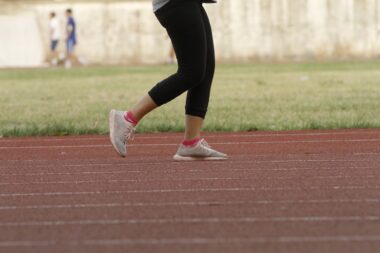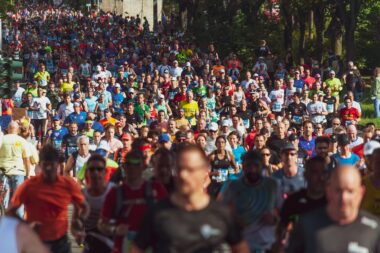Top 10 Urban Marathon Training Tips for Beginners
Starting an urban marathon training program can be both exciting and daunting for beginners. It is essential to have a strategic approach to training to boost both confidence and performance. Make sure to invest in a good pair of running shoes that suit your foot type. Well-fitted shoes can prevent injuries and enhance comfort. Additionally, be aware of your route. Urban settings can offer unique challenges, such as traffic and uneven surfaces. Always plan your runs at times when foot traffic is low. Not only does this enhance your safety, but it also allows you to focus on your pace without distractions. Equally important is hydration. Ensure you carry water, especially in warmer climates, to keep well-hydrated. Joining local running clubs can provide support and camaraderie, making your training more enjoyable. Regularly tracking your progress using apps can keep motivation high. Also, get used to varying your training routes to stay engaged. Lastly, make time for rest days, as recovery is crucial for long-term success.
Consistency is key when training for an urban marathon. Set a weekly running schedule, incorporating both short and long runs. Be sure to mix the pace during runs; incorporating interval training can boost your speed significantly. This means running at a faster pace for short periods followed by slower recovery phases. Also, consider cross-training with other activities like cycling or swimming to build strength without overworking your legs. Resistance training is equally essential. Focus on core muscles and leg strength to support your running posture and efficiency. This makes a huge difference during long distances. Emphasizing flexibility through stretching exercises can also help reduce the risk of injuries. Make sure to warm up before each session and cool down after. The urban environment provides many opportunities for engaging runs. Parks, waterfronts, and pathways can be great alternatives to busy streets. Consider running with a friend or in groups to maintain accountability. Additionally, pay attention to nutrition. Fuel your body with the right foods before and after workouts to maximize performance. Consume a balanced diet rich in carbohydrates and protein to aid recovery.
Setting Realistic Goals
When delving into urban marathon training, it is vital for beginners to set realistic and achievable goals. Start with smaller milestones first, such as completing shorter races before progressing to a marathon distance. This incremental approach eases the transition and builds confidence. Utilize local races as benchmarks to evaluate your training progress. The focus should be on running your first marathon without pressure. A positive mindset is critical during training; celebrating small victories can bolster motivation. Consistently remind yourself of the reasons you started this journey. Another valuable tip involves working on mental strategies. Focus on visualizing your success and staying mentally prepared for each run. Mental fatigue can be as challenging as physical fatigue. Developing a mantra or motivational phrase can help you push through when the going gets tough. Remember, every long-distance runner has faced challenges, and resilience is key to overcoming them. Participate in workshops or seminars focused on running to learn more tips. Networking with other runners can provide insight and encouragement. Trust the process, and remember, preparation is half of the challenge in successfully completing a marathon.
Nutrition plays a pivotal role in urban marathon training success. Proper fueling of your body can make significant differences during long runs. Before heading out for a run, consume light meals, often consisting of carbohydrates and a small amount of protein. Foods such as oatmeal, whole grain toast, or bananas are excellent options. Post-run nutrition is equally important. Refuel with a mix of carbohydrates and proteins to help muscle recovery. Consuming a recovery shake can be efficient after intense workouts. Furthermore, experiment with nutrition during longer runs to find what works best for your body. It’s essential to train your stomach just like you train your legs. Some runners find that energy gels or chews help maintain energy levels during long distances. Don’t overlook hydration during training, either. Aim to hydrate before, during, and after your runs, particularly in an urban setting where the sun may heat elements. Consider carrying a small water pack or using hydration stations. This ensures your body stays nourished and functioning optimally throughout your entire training cycle.
Incorporating Rest and Recovery
A critical aspect of marathon training often overlooked by beginners is the importance of rest and recovery. Many mistakenly believe skipping rest days translates to improved strength and speed. In reality, consistent running without adequate recovery can lead to burnout or injury. Therefore, it is crucial to schedule regular rest days throughout your training calendar. You could also include easy recovery runs, where you run at a comfortable pace to help replenish your energy without overexertion. Stretching or yoga on rest days can also promote healing and flexibility. Focus on quality sleep; lack of sleep impacts performance and recovery. Aim for at least seven to eight hours of sleep each night to keep your body in optimal condition. Listen to your body: if it signals extreme fatigue, take an additional rest day. Develop active recovery routines, like light walking or gentle swimming, to stimulate blood flow and loosen tight muscles. Moreover, massage therapy can alleviate soreness and enhance muscle recovery. Incorporate this holistic approach into your routine for successful marathon training.
Weather variations in urban environments can impact your marathon training significantly. Always check weather forecasts before planning your run. In rainy conditions, consider wearing water-resistant gear to stay dry. Running on wet surfaces can be slippery; be cautious and adjust your speed accordingly. If it’s hot and humid outside, consider running during cooler parts of the day, like early mornings or late evenings. Additionally, allow yourself to adapt to different temperatures by gradually increasing your exposure. Cold temperatures can reduce your muscle flexibility, so make sure to warm up well. In contrast, it’s essential to stay hydrated in humid weather, as perspiration may increase significantly. Dress in layers during varying weather conditions to adjust your comfort easily. Urban areas typically have sufficient facilities like water fountains or shaded areas, which can be beneficial. Understanding how weather affects performance can improve your training efficiency. Always embrace adaptability and strategize your runs according to forecast changes. Interpreting and responding to these elements not only builds physical stamina but also mental resilience for race day conditions.
Conclusion: Embrace the Journey
Completing your first urban marathon is about more than just finishing the race; it’s an enriching journey of personal growth and discovery. Following the above tips will help create a structured training plan tailored for beginners. Remember, every training run brings you closer to your goal, and embracing each step of the way is pivotal. Stay enthusiastic and open-minded, adapting your plan as necessary based on your experiences. Surround yourself with supportive communities, whether online or in your local area. Motivation tends to flourish in groups, keeping the spirit alive even during tough workouts. Don’t forget to enjoy the process; celebrate your milestones, big or small, and remain focused on your personal goals. Cultivate self-discipline and believe in your abilities. This journey could become life-changing as you actively work towards completing an urban marathon. Finally, share your experiences and lessons learned with others, for it might inspire fellow beginning runners. As you lace up your shoes and take on the cityscape, remember that persistence, resilience, and joy will lead you to triumph on race day.





